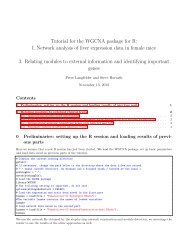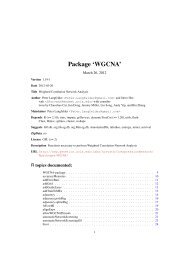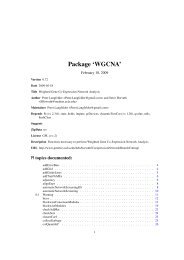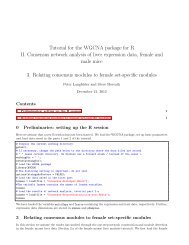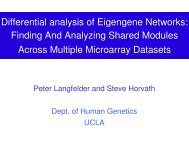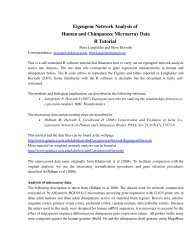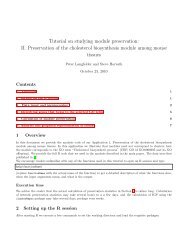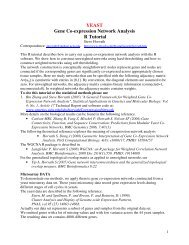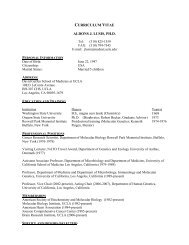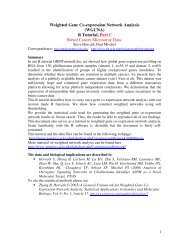Package 'WGCNA' - Laboratory Web Sites - UCLA
Package 'WGCNA' - Laboratory Web Sites - UCLA
Package 'WGCNA' - Laboratory Web Sites - UCLA
You also want an ePaper? Increase the reach of your titles
YUMPU automatically turns print PDFs into web optimized ePapers that Google loves.
30 consensusProjectiveKMeans<br />
Author(s)<br />
Peter Langfelder, 〈Peter.Langfelder@gmail.com〉<br />
See Also<br />
moduleEigengenes, multiSetMEs, orderMEs<br />
consensusProjectiveKMeans<br />
Consensus projective K-means (pre-)clustering of expression data<br />
Description<br />
Usage<br />
Implementation of a consensus variant of K-means clustering for expression data across multiple<br />
data sets.<br />
consensusProjectiveKMeans(<br />
multiExpr,<br />
preferredSize = 5000,<br />
nCenters = NULL,<br />
sizePenaltyPower = 4,<br />
networkType = "unsigned",<br />
randomSeed = 54321,<br />
checkData = TRUE,<br />
useMean = (length(multiExpr) > 3),<br />
maxIterations = 1000,<br />
verbose = 0, indent = 0)<br />
Arguments<br />
multiExpr expression data in the multi-set format (see checkSets). A vector of lists, one<br />
per set. Each set must contain a component data that contains the expression<br />
data, with rows corresponding to samples and columns to genes or probes.<br />
preferredSize<br />
preferred maximum size of clusters.<br />
nCenters number of initial clusters. Empirical evidence suggests that more centers will<br />
give a better preclustering; the default is as.integer(min(nGenes/20,<br />
preferredSize^2/nGenes)) and is an attempt to arrive at a reasonable<br />
number given the resources available.<br />
sizePenaltyPower<br />
parameter specifying how severe is the penalty for clusters that exceed preferredSize.<br />
networkType network type. Allowed values are (unique abbreviations of) "unsigned",<br />
"signed", "signed hybrid". See adjacency.<br />
randomSeed<br />
checkData<br />
integer to be used as seed for the random number generator before the function<br />
starts. If a current seed exists, it is saved and restored upon exit.<br />
logical: should data be checked for genes with zero variance and genes and<br />
samples with excessive numbers of missing samples Bad samples are ignored;<br />
returned cluster assignment for bad genes will be NA.



